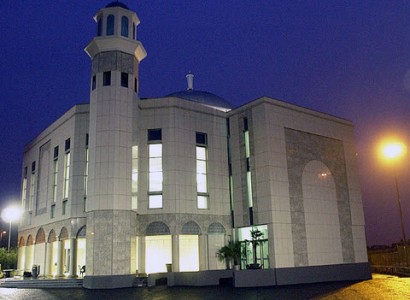
Why Facebook must do more to challenge anti-Muslim hate posts, by Rima Amin “Love for All, Hatred for None” is the motto carried by the Ahmadiyya Muslim community. A motto that has been tested in recent days after a surge of hateful comments towards Muslims on social media following a fire at the Baitul Futuh mosque
The post After the fire, why the Ahmadiyya community will not give into hate , by Rima Amin appeared first on TELL MAMA.
Continue Reading
We have commented on the mosque fire at the Baitul Futuh mosque today. Yet, a simple search of Facebook pages where the fire was highlighted, such as the Evening Standard Facebook page, shows the following vile hateful comments below. These are just a few snapshots of comments which are made at the start of the
The post Thousands of Anti-Muslim Posts Today Could Fuel Reverse Extremism appeared first on TELL MAMA.
Continue Reading
“Love for All, Hatred for None“, is the motto of the Ahmaddiya community globally. It is a community that is openly persecuted in Pakistan where the State structures are built to discriminate against them after the dictator Zia Ul Haque introduced stringent laws into the country as a way of building up support with militant
The post As Baitul Futuh Burns, the Bigotry of Some Muslims Towards Ahmaddiyas Comes Out appeared first on TELL MAMA.
Continue Reading
This morning we highlighted deeply offensive comments by ‘Twitter’ spinner Karen Danczuk. It seems that the lives of 717 Muslim pilgrims becomes Twitter chatter for some. Never to miss an opportunity to build a career on inflammatory statements, Katie Hopkins has also jumped into the mix. Yesterday she tweeted the following: “717 pilgrims killed in
The post Katie Hopkins: Muslim Hajjis Practice Sharia Stoning appeared first on TELL MAMA.
Continue Reading
Over the summer, Pope Francis apologised for the “Many grave sins were committed against the native people of America in the name of God.” “I humbly ask forgiveness, not only for the offense of the church herself, but also for crimes committed against the native peoples during the so-called conquest of America,” the pope said. But his decision to canonise Father Junípero Serra, on his first visit to the United States next week, has angered many groups. An online petition against the canonisation has gained over 10,000 signatures. Many of the counter voices are descendants of those colonised. For Ron Andrade, executive director of the Los Angeles City/County Native American Indian Commission, and of the Luiseño tribe, said Serra “decimated 90% of the Indian population”. Serra (1713-1784), was an ordained Franciscan priest and professor of theology by the age of 24. By 1749, Serra accompanied other Franciscans dedicated to missionary work in Mexico. He also preached, heard confessions, and assisted at Mexico City’s College of San Fernando. In 1767, Spain founded the first mission in California. Estimates put the Native American population at about 310,000; yet in under a century, that figure declined at a rapid rate, alongside cultural shifts. Spain’s [...]
The post Why is Junípero Serra’s canonisation so controversial? appeared first on Religious Reader.
Continue Reading
A footnote to Europe’s ongoing crisis is the rising use of anti-Muslim rhetoric. Hungary’s nationalist prime minister, Viktor Orbán, defended the erecting of a razor-wire fence on its southern border through the language of cultural and religious difference. Orbán stated that “most of them are not Christians, but Muslims,” and that “Europe and European identity is rooted in Christianity. Is it not worrying in itself that European Christianity is now barely able to keep Europe Christian?” Antal Rogan, the parliament caucus leader of Orbán’s Fidesz party, said on Tuesday that “the very existence of Christian Europe” was at stake. Rogan also told the pro-government newspaper Magyar Idok “Would we like our grandchildren to grow up in a United European Caliphate? My answer to that is no”. Ivan Metik, a spokesperson for Slovakia’s interior ministry spokesman said last month: “We want to help Europe with the migration issue. We could take 800 Muslims but we don’t have any mosques in Slovakia so how can Muslims be integrated if they are not going to like it here?” In July, Slovakia’s prime minister, Robert Fico, argued that Christians would cause less tension. He added that terrorists might attempt to mingle among Muslim refugees. [...]
The post Europe’s current crisis reflects its own anxieties about Muslims appeared first on Religious Reader.
Continue ReadingWelcome to the age of post-ism. Racism is over, ageism is over, classism is over and so is sexism too, or at least this is popular thought. However, feminism is needed more now than ever and yet our feminist movement is beginning to eerily reflect the sort of attitudes we should be striving against, and at times blatantly demonstrating racist and illiberal attitudes. Feminists have in the past seemed ill at ease with the religious, who have in some cases campaigned against abortions and gay marriage – the cornerstones it could be argued of modern feminist achievement. However with more dangers against women from the state than ever before, how can Western feminism become more inclusive of minority values, and in turn the religious? First we must reflect on what feminism has always been about – was it to focus solely on the individual of the day or to empower women to be able to make decisions about themselves, for themselves? Focusing on a specific religious action with little understanding of context can cause unnecessary divides, whereas uniting on common ground such as wage disparity, maternity rights, and homelessness is plain common sense. Women: the all too often disproportional victims [...]
The post Why feminism needs to ditch colonial attitudes to claim inclusivity appeared first on Religious Reader.
Continue Reading
It is too often erroneously claimed that Sunni Islam is divided into a legalistic conservative mainstream presided over by jurists, and a mystical, liberal marginalised minority comprised of mystics. However such a perception came to emerge, it is inaccurate. From the beginnings of Islam in the Qur’an and in the person of the Prophet Muhammad himself, through to his companions and the jurists who established the four Sunni schools of Islamic Law, the external application of the law and the internal cultivation of the spirit have always been intertwined. Consider the ritual prayer, performed by Muslims five times a day, as this most demonstrates the interdependence of the external and the internal. In the Qur’an it is said, “Perform the Prayer to remember Me.” In this it is made clear that the Prayer is not simply a series of movements and supplications performed in accordance with an established formula. Rather, its objective is the remembrance of God. The Prophet Muhammad elaborates that, “When performing the Prayer, one is conversing intimately with one’s Lord.” However, he makes clear that, “A man gets credit only for that part of his Prayer of which he is conscious,” and it is not sufficient to [...]
The post Islam and Sufism: the false dichotomy of mystics and jurists appeared first on Religious Reader.
Continue Reading
Dr. Imam Mamadou Bocoum is a holder of two Masters and a PhD from The Muslim College, and Heythrop College, University of London. He is a lecturer in Islamic Studies; a Board member of the Muslim Law Council UK and an interfaith consultant. He is currently a consultant at Faith Matters and Tell Mama. Mamadou has authored a number of written works which have included: The Position of Jews and Christians in the Qur’an; Faith and Citizenship in Islam; The status of Women in Islam; Islamic Fundamentalism and the Qur’an. He can be reached at mbocoum@yahoo.com; Mamadou@tellmamauk.org. While delivering a talk on ‘extremism in the religion of Islam’, an audience member shouted: “Bush, Blair and Bin Laden are all f——s”. I pretended that I had not heard but this was to no avail as the same individual shouted again – but this time in a louder tone – “All of them are f——s”. The heckler’s pronunciation was rather difficult to interpret (like mine!) and I thought that he meant the offensive six-letter designation. It proved a great relief when someone clarified that the ‘f word’ was fundamentalist. I then responded that besides sharing initial ‘B’ in their respective family names, [...]
The post Scholar’s corner: where does Islamic fundamentalism stem from? appeared first on Religious Reader.
Continue ReadingIt is almost unthinkable to speak of violence without equating it with religion. This is true in many ways as Mark Juergensmeyer notes: “Violence has always been endemic to religion. Images of destruction and death are evoked by some of religion’s most popular symbols, and religious wars have left through history a trail of blood. The savage martyrdom of Husain in Shiite Islam, the crucifixion of Jesus in Christianity, the sacrifice of Guru Tegh Bahadur in Sikhism, the bloody conquests in the Hebrew Bible, the terrible battles in the Hindu epics, and the religious war attested to in the Sinhalese Buddhist chronicles indicate that in virtually every tradition images of violence occupy as central a place as portrayals of non-violence. This raises two haunting questions: why are these images so central, and what is the relationship between symbolic violence and the real acts of religious violence that occur throughout the world today”.[1] Juergensmeyer raises some interesting questions and René Girard believes “that [his] mimetic theory offers an exhaustive explanation of the phenomenon of religious-inspired violence”.[2] In contrast, Michael Kirwan confidentially claims that Girard anticipated ‘religiously-inspired’ violence and atrocities (including 9/11).[3] Therefore, one does not need to look further to understand this [...]
The post Scholar’s corner: what can René Girard teach us about religion and violence? appeared first on Religious Reader.
Continue Reading